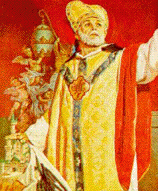May 25: Pope Gregory VII
Pope Gregory VII "Hildebrand" (d. 1085)
It was on this date, May 25, 1085, that Pope Gregory VII, often called by his pre-Papal name, Hildebrand, died in exile at Salerno, Italy, at about the age of 70. Hildebrand was born Hildebrand of Sovana (Ildebrando da Soana), in obscurity, sometime around 1025 and perhaps acquired the reputation as a stern ascetic in penance for a misspent youth. He wore monastic attire, but whether he ever was a monk is disputed.
One of his signature achievements before becoming Pope was to persuade the Lateran Synod of 1059 to deprive the Roman people and clergy of the right to elect the Pope, giving this power to the cardinals instead. But, fourteen years later, Hildebrand himself accepted election, by "popular tumult," on 29 June 1073. His reformist zeal was never more needed, as the Catholic Encyclopedia tells it:
... the Christian world was in a deplorable condition. During ... that terrible period of warfare and rapine, violence, and corruption in high places ... the Church had not been able to escape from the general debasement. The tenth century, the saddest, perhaps, in Christian annals, is characterized by the vivid remark of Baronius that Christ was as if asleep in the vessel of the Church.
The methods used by Gregory were equal to the general corruption: He claimed the right to interfere in any secular or spiritual affair of any country in Europe. "If the Pope is supreme in spiritual things," he arrogantly pronounced, "he had all the greater right to intervene in the smaller matters which are called temporal." He and his church officers freely used forgeries in establishing his authority. Saying, "Cursed be he that refraineth his sword from blood," he started or encouraged wars for the purpose of annexing kingdoms to the Church.
He employed Patarine mobs, armed with staves, to beat and otherwise abuse the (legally) married clergy into submission to his rule that the priesthood was henceforth to be celibate. Gregory "deposed" Henry IV – a new power based on another Papal forgery – and forced Henry to kneel in the snow outside the gates of the Castle of Cannossa and beg absolution on 28 January 1077. In fact, Henry only went through the form of penance, as his excommunication (releasing his subjects from loyalty) would have harmed his prosecution of an ongoing civil war. And the moment Henry left Canossa he resumed his dispute with Gregory – and, after the Pope's death, he won.
It is true that Gregory tried to reform the moral sewer that was 11th century Rome. But the methods of this rough, violent, ignorant, fiery-tempered peasant, won him disdain throughout Europe. A German synod of bishops and abbots declared him deposed, and in his last year the Romans drove him into exile, infuriated by the brutality of his Norman henchmen. It is therefore only the Catholic Encyclopedia that can find it anything but ironic to quote Gregory's dying words: "I have loved justice and hated iniquity, and therefore I die in exile." His exile to a castle in Salerno was his just deserts: The end of his life was the beginning the most morally loose period in the history of Europe – now mythologized as the "Age of Chivalry." He was beatified by Pope Gregory XIII in 1584, and canonized in 1728 by Pope Benedict XIII as Pope “St.” Gregory VII.
Originally published May 2003 by Ronald Bruce Meyer.


